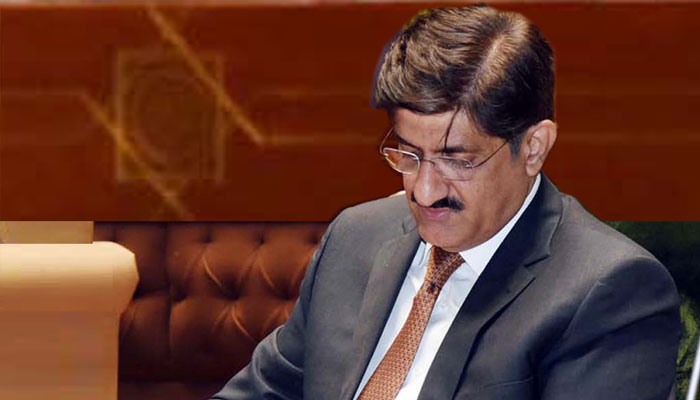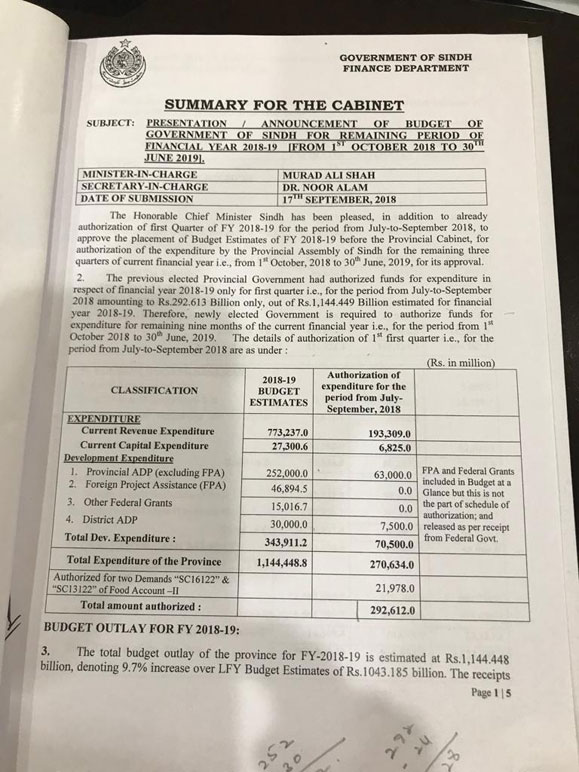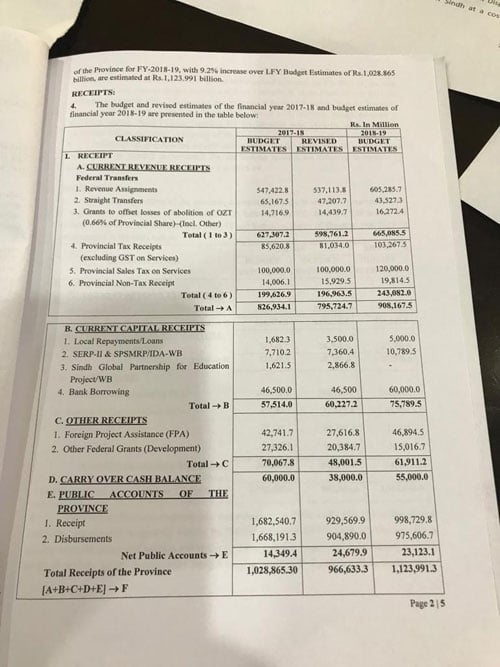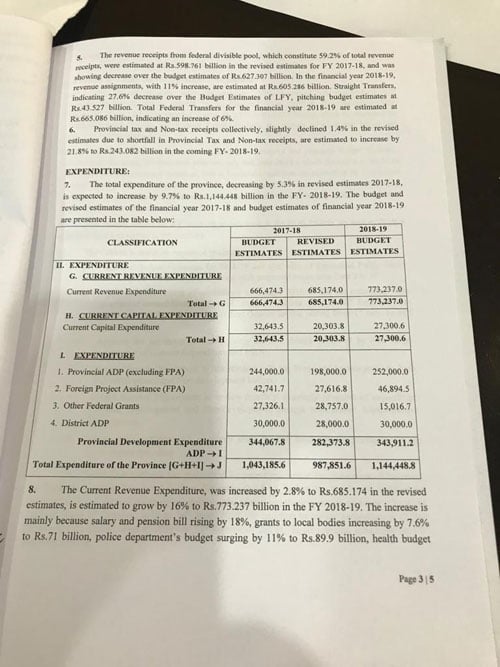Shortfall in federal transfers: Murad axes ADP by Rs 24 bn
Sindh Chief Minister Syed Murad Ali Shah has said that due shortfall in federal transfers the provincial development portfolio faces an allocation cut of Rs. 24 billion reducing the size of Provincial ADP - 2018-19 from Rs282 billion to Rs. 228.00 billion out of which Rs.5 billion would be diverted to district ADP which would be enhanced from Rs.30 billion to Rs.35 billion and Rs. 21billion would be authorized for new ADP schemes.
Sindh Chief Minister Syed Murad Ali Shah has said that due shortfall in federal transfers the provincial development portfolio faces an allocation cut of Rs. 24 billion reducing the size of Provincial ADP - 2018-19 from Rs282 billion to Rs. 228.00 billion out of which Rs.5 billion would be diverted to district ADP which would be enhanced from Rs.30 billion to Rs.35 billion and Rs. 21billion would be authorized for new ADP schemes.
This he disclosed on Monday while presenting budget for 2018-19 on the floor of the house and sought authorization of the remaining nine months, October 2018 to June 30, 2019.
Budget: Presenting budget for the financial years, 2018-19, the chief minister told the house that during the announcement of the budget 2018-19, the house was requested to authorize expenditure for only three months, 1st July to 30th September 2018.
Murad Ali Shah said that the total budget outlay for current financial year 2018-19 was Rs. 1,144.5 billion.
He added that the previous elected provincial government had authorized funds amounting to Rs. 292.613 billion for first quarter of 2018-19. The total current revenue expenditure was Rs773.3 billion out of which Rs. 193.3 billion stood authorized. He said that as against current capital expenditure of Rs. 27.3 billion, Rs. 6.9 billion has already been authorized. For development side, Rs. 63 billion were authorized.
Talking about development budget, Murad Ali Shah said that the total development budget outlay during 2018-19 was Rs.343.911 billion. Out of this Rs.252.00 billion was estimated for Provincial ADP and Rs.30 billion for district ADP schemes, Rs.46.895 billion from Foreign Projects Assistance (FPA and FERP) and Rs.15.017 billion by the federal government through PSDP schemes under execution of Sindh Government. The Provincial ADP 2018-19 includes Rs.202.00 billion for 2226 on-going schemes, and a block allocation of Rs.50 billion was estimated for new schemes.
He said that that provincial development portfolio now faces an allocation cut of Rs. 24 billion. “Now the size of Provincial ADP for 2018-19 is Rs. 228.00 billion out of which Rs. 5 billion will be diverted to district ADP which would be enhanced from Rs.30 billion to Rs.35 billion and Rs. 21.0 billion would be authorized for new ADP schemes.”
Mr Shah said that he has taken this unpleasant decision of reducing ADP allocation because the provincial government was facing financial constraints in view of shortfall in federal transfers. He added that the Provincial Government was largely dependent on the federal government for its revenue receipts including revenue assignments, straight transfers and OZT grant, which constitute about 75 percent of the combined federal receipts and provincial tax and non-tax receipts.
The chief minister said that the actual transfers from Federation to Sindh government always fall short of the estimates provided during a fiscal year. He added that with the unpredictability of these fiscal transfers from the federal to provincial government, budget preparation becomes cumbersome as the projections of non-development expenditure and development portfolio were largely based on these estimates. Mr Shah said, resultantly, provincial development expenditure has to be adjusted to offset the effect. “During the last financial Year 2017-18 the budgeted receipts of federal transfers was Rs. 627.3 billion which was revised to Rs. 598.8 billion whereas actually we received only Rs. 549.9 billion i.e. a shortfall of Rs. 77.4 billion,” he said and added the receipts of federal PSDP were revised to Rs.20.385 billion from Rs.27.326 billion whereas revised Foreign Project Assistance stood at Rs. 27.7 billion as against Rs.42.7 billion. Resultantly we have to cut our development allocation for new schemes from Rs. 50.00 billion to Rs. 26.00 billion, the chief minister said.
The 9th NFC award is also long awaited which is causing a huge economic loss to the provinces, especially Sindh because its revenue collection is much higher as compared to other provinces. We, therefore, urge the Federal Government to start deliberations of the commission soon so that further loss to our province could be avoided.
He pointed out that the performance of Sindh Government in tax collection has improved significantly after 18th amendment. One of the remarkable achievements of Sindh Government is the establishment of Sindh Revenue Board (SRB) for the collection of sales tax on services after 2009 NFC and 18th constitutional amendment. SRB is now the largest authority to collect sales tax on services in Pakistan and it has registered 25% average growth in collection of sales tax in successive years since its inception. In FY 2017-18 the Sindh Government collected a total of Rs. 100.290 billion in sales tax on services. We are once again requesting the federal government to hand over the collection of general sales tax on goods to the provinces for better tax collection.
The chief minister said that the focus of this budget is the optimal utilization of the resources to achieve our objectives of socio-economic development. The Sindh government has planned to provide adequate infrastructure and services in social sectors like education, health, water supply and sanitation, food security, energy and infrastructure sectors., Murad Shah said and added his government has also planned to introduce austerity measures in financial management to keep a check on unproductive government expenditure. “There would be a reduction on purchase of new vehicles except for the operation vehicles for police force and hospitals like ambulances, buses, police APC carriers, prison vans etc. Purchase of luxury items would also be kept under control,” he said.
Talking about, ADP Mr Shah said he has devised a comprehensive development programme. “Our priority is to provide more funds for the on-going development schemes and have allocated Rs. 202 billion during 2018-19 for the on-going schemes as compared to Rs.151 billion in last financial year 2017-18 which was an increase of 25 percent. The government is engaged in development of policies, strategies and plans for key sectors which include; Education, Health, Agriculture, Water Resources, Energy, Transport & Communication, Clean drinking water & Safe disposal of sewage. The Government of Sindh has organized Sindh Development Forum (SDF) in March, 2018 where all stakeholders from Government, International Development Partners, Academia, NGOs, INGOs & Civil Society participated to identify the development gaps in these areas.
The Government of Sindh has also planned to implement multi-million major projects to provide adequate infrastructure and services in social sectors like education, health and water supply & sanitation and also to build urban transport & communication, starting with introducing BRTS lines, like Orange line and Red line in Karachi. It is believed that people of the province will benefit from these ongoing development initiatives to be completed in near future.
The ADP 2018-19 was initially prepared during the month of Mar-April 2018 when Government of Sindh decided to provide development funds Rs.202 billion for ongoing schemes only and authorized the expenditure for first quarter July –September 2018. However, a block provision of Rs.50 billion was kept for new schemes to be decided by the next government. This block allocation has now been reduced and an allocation of Rs.26 billion is kept in ADP 2018-19 for new schemes having a breakup of Rs.21.0 billion for Provincial ADP and an additional amount of Rs.5 billion for district ADP schemes of high priority, especially schemes of education, health, water & sanitation sectors.
The Government of Sindh is giving more emphasis on completion of ongoing schemes, therefore sufficient funds have been allocated for the purpose. It is expected that 958 schemes of ADP 2018-19, where 100 percent remaining funds have been allocated, are likely to be completed by June 2019.
These measures reflect our resolve to bring significant improvement in the life of common man. It is our commitment to implement PPP’s election manifesto 2018 because we have returned to assemblies in general elections because of our past performance. Our party has always led from the front on all issues that matter to the people of this great country.
Law & Order : The chief minister said that his top most priority was maintenance of law and order. “We have restored peace to Karachi and rest of Sindh, now we have to sustain it and we will make necessary investment in human resource and physical assets to achieve this objective,” he said and added however, street crime has increased in the last couple of months and we are making efforts to eliminate it effectively.”
He added that the total budgetary allocation for home department during 2018- 19 is Rs.102.483 billion out of which Rs.2,000 million have been allocated on the development side. “We are committed to introduce police reforms in order to make police efficient, community friendly and effective force,” he said and added during our last tenure his government had started capacity building of police force and police personnel were sent to army centers for training and over 10,000 policemen were recruited on merit.
Mr Shah said during 2018-19 his government was main focus was to further strengthen the police force by improving infrastructure specially police stations/lines for which Rs.640.0 million. Rs. 80 million has been allocated for enhancing capacity of investigation branch through purchase of GSM locators and modern investigation kits. An allocation of Rs. 750 million has been kept for purchase of bullet proof jackets, helmets and Arms & Ammunition. For reshaping police on modern lines and IT initiatives, we have allocated Rs.250 million.
Education : Sindh government was committed to provide better quality of education, which remained our highest priority and responsibility. During 2018-19, the non- development budget of education has been increased from Rs.178.7 billion to a total of Rs.211.0 billion. Whereas on development side, Rs. 24.4 billion are allocated in ADP 2018-19 as compared to Rs.17.1 billion in last financial year 2017-18, for on- going schemes which would be utilized as per priorities of the government which include provision of missing facilities. He spelt out his priorities as follows:
To improve the quality of education, the Sindh government has taken initiative for “Rehabilitation & Expansion of High Priority 4560 Schools” having higher enrollment for carrying out major and minor repair work and provision of missing facilities like boundary wall, washrooms, drinking water, furniture & construction of additional classrooms. This will provide additional space for over 550,000 additional students. During t 2018-19, 2632 primary/ elementary and high schools having all the essential facilities will be brought into the system which have been carefully selected on merit in all 29 districts of Sindh.
106 high schools are under construction in seven districts of Northern Sindh (Sukkur, Khairpur, Larkana, Dadu, Kamber @ Shahdadkot, Jaccobabad and Kashmore) and 05 towns of Karachi (Bin Qasim, Gaddap, Keamari, Liyari & Orangi), to improve the quality of education and promotion of girls education. A total of 33 High Schools have been completed out of which 23 have been handed over to various Education Management Organizations (EMOs), in Public Private Partnership arrangement for 10 years to improve the quality of education in these schools.
With the assistance of JICA, 54 new buildings/infrastructure are being constructed for up gradation of 54 Girls Primary Schools into Elementary Schools in 12 districts of Sindh such as Mirpurkhas, Badin, Tando Allahyar, Hyderabad, Jamshoro, Benazirabad, Dadu, Larkana, Khairpur, Sukkur, Ghotki & Shikarpur.
The Sindh government during 2017-18 established 21 English Medium Schools and six Comprehensive High Schools in various districts which would be made operational under PPP Mode by April 2019. Six more new English Meduim Schools would be completed by June 2019 in districts Shaheed Benazirabad, Sanghar, Khairpur, Dadu, Kamber @ Shahdadkot and Ghotki.
Health: The allocation for health sector during 2018-19 is Rs.102.224 billion on non-development side and Rs.12.50 billion on development side. The chief minister said his focus would be on provision of missing facilities in hospitals, especially at the tehsil and district level.
The chief minister said that his government has provided Rs200 to Atomic Energy Medical Centre, JPMC, for purchase of two Cobalt-60 Radio therapy units during last two years. In 2018-19, Rs. 78 million has been kept for Patient Aid Foundation for annual repair and maintenance of two cyber knife at JPMC.
The government is investing Rs. 18.271 billion for up- gradation, expansion and improvement of 17 DHQ/THQ hospitals and construction of 41 emergency-cum trauma centers in Sindh. It is planned that 14 DHQ/THQ Hospitals and 41 emergency-cum trauma centers would be completed and functionalized by June 30, 2019. Work on DHQ hospitals Mithi, Kandhkot & Thatta would be expeditiously pursued. To cater the essential need of emergency cases, a trauma center with emergency operation theatre, two wards and allied facilities would also be established at Naudero, Larkana.
JIC&RC : The provincial government has established first Cyber Knife Robotic Surgery unit at JPMC under the public- private partnership mode with Patients Aid Foundation (PAF) which is operational since 2012. The Second Cyber Knife unit will be operational by December 2018 which will enhance the capacity from treatment of 08 patients per day to 24 patients per day free of charge.
The Sindh government, in collaboration with Patients Aid Foundation (PAF), has also planned to establish Jinnah Institute for JIC&RC for Rs. 06 billion. The first phase of this world-class project will have a 12-story tower with six new therapy units and 320 beds with the facilities to diagnose and treat all types of cancers free of cost under one roof. The Sindh government will provide Rs.3 billion and the remaining Rs.3 billion will be arranged by PAF for civil works.
NICVD and SIUT: The NICVD has become world’s largest center for angioplasties. Through the sustained efforts of Sindh government NICVD is now providing expensive life saving devices (ICD and 11 CRT) free of cost to poor patients. The Sindh government has established NICVD satellite centers at Tando Muhammad Khan, Larkana, Hyderabad and Sehwan with modern and well equipped cardiac facilities. Very soon three more NICVD centers will be made operational at Nawab Shah, Khairpur and Mithi. The government has enhanced the Grant for NICVD from Rs. 5.76 billion to Rs. 8.87 billion for current financial year. The provincial government was also providing a Grant of Rs. 5.6 billion to SIUT to sustain its services in Karachi and for its new initiatives in other cities.
JPMC OPD & COMPLEX : The Sindh government is also constructing a well-equipped OPD and surgical complex at JPMC under PPP mode with Patients Aid Foundation. Building of the hospital is near completion. Inpatient and OPD sections will be completed by Dec 2018. The two floors of the OPD are already operational since May 2018. The estimated cost for OPD and Inpatients/OTs comes to Rs 1.4 billion, out of which provincial government to contribute Rs.1.1 billion in three years for purchase of in patients and operation theaters equipment. An amount of Rs.100 million has already been released. In 2017-18 Rs. 325 million were released for purchase of medical equipment for eight operation theaters, CSSD and Laundry and during the current financial year 2018-19, Rs. 750 million would be released for timely completion of the project in 2019.
C-ARTS AUSTIM CENTRE : The chief minister said that he has recently inaugurated C-ARTS in Gulistan-e-Jauhar which is the first and only one in Pakistan offering comprehensive programs, with specialized staff, for diagnosis of adolescent and adult individuals with autism. This facility has 38 rooms with a capacity to accommodate 300 patients.
Malnutrition & stunting : Sindh is facing challenges of malnutrition and stunting. As many as 48 percent of Sindh’s children suffer from stunting or chronic malnutrition. The Sindh government, in collaboration with partners, has started a multi-sectoral plan of action which focuses on international best practices to combat malnutrition by adopting nutrition specific and nutrition sensitive interventions. “We are allocation Rs.4.27 billion in the 2018-19 and the major departments responsible for this programme are Health, Agriculture, Livestock and Fisheries, Local Govt. and Social Welfare,” the chief minister said.
Clean drinking water & sanitation: Another high-priority area of the government as stated by the chief minister was the provision of clean drinking water and sanitation facilities to the people. Some of the government initiatives in different districts of the province have focused on the construction of sewage water treatment plants, filtration plants, and Reverse Osmosis (RO) plants to meet the water shortages. He said that he has also conceived a desalination plant on the sea having a capacity of around 300 MGD to produce drinking water. This project will be launched through public private partnership and will enhance KWSB’s water distribution network capacity.
Energy : Murad Ali Shah said in order to make Pakistan a self-sufficient country in terms of its energy needs, Sindh is playing its due role by attracting new investments through a variety of fiscal and monetary incentives.
In the renewable energy sector, Sindh government has recently negotiated and finalized with the World Bank `Sindh Solar Energy Project’ for deployment of solar PV technologies in Sindh for $ 105 million. The project will finance 20MW of distributed solar photovoltaic panels on rooftops and other available space on and around public sector buildings in Sindh, in a phased manner with an initial target of 200,000 households.
Thar Coal: In 2008 the Sindh Government undertook an ingenious step with the formation Sindh Engro Coal Mining Company - a Public Private Partnership with Engro to develop Pakistan’s first open-pit coal mine in Thar Block-II. However, after contributing $110 Million as equity, the Sindh government did not remain a silent investor in the project – but in order to finance the $845 Million mining project, Sindh government accepted the primary obligation to $700 million Sovereign Guarantee issued by Government of Pakistan. Furthermore, Government of Sindh got the Thar Coal Mining and Power Projects included in CPEC early harvest projects which allowed Chinese financing for these projects. But, all of this wasn’t enough to turn the Thar dream into reality, Murad Shah said and added the key infrastructure, including hundreds to kilometers of road network including the brand new Thatta-Sajawal bridge on river Indus, a well-equipped airport at Islamkot, LBOD Fresh water supply scheme for providing water to mine-mouth power plants in Thar and the 50 Cusecs Effluent Disposal Scheme were financed and constructed by Sindh for Rs. 75 billion.
Chief Minister Murad Ali Shah said that the Sindh government finally reached fruition on June 10th 2018, when Sindh Engro Coal Mining reached the first seam of Thar Coal at a depth of 141 meters. He added that the proof of concept for Thar Coal will be demonstrated in Dec 2018, when the first electrons will flow from the first 330 MW Thar Coal based power plant of Engro Power Gen Thar Ltd into the National Grid. But that will just be the start of a long and prosperous journey wherein SECMC’s coal mine will be quickly expanded to 30 million tons per annum of coal production which can fuel 5000 MW of cheap and reliable based load power for the next 50 years.
Poverty Reduction (PPRP) : The Sindh government in 2009 envisioned Union Council Based Poverty Reduction Program (UCBPRP) initially implemented in two districts, Shikarpur and Kashmore for Rs. 3.36 billion with the specific objectives to reduce poverty, improve the quality of life of the poor and marginalized communities through social mobilization, capacity development, asset creation, income generation and provision of low cost houses. The Program was extended in two more Districts, Jacobabad and Tharparkar in 2010 for Rs 2.009 billion.
Mr Shah said that the programme achieved great success in these four districts covering 157 Union Councils, by organizing 343,084 households at community and village level, giving of Income Generation Grants to 10,043 households and interest free loans to 112,406 households. Besides that, 9,072 shelter less households were provided low cost housing unit, 124 water supply schemes were rehabilitated, 34,211 persons were Imparted Vocational Training, 114,328 households were protected under Micro Health Insurance, 195 Schools were functionalized and 43 Villages were rehabilitated.
The programme was further expanded and launched in six more districts, Umerkot, Sanghar, Mirpurkhas, Khairpur, Badin and Thatta in May 2017 for Rs.4.916 billion. The program currently covers 367 Union Councils under the expansion phase in which 34,372 households will be provided Income Generating Grants, 137,492 household will be provided Interest free loans as Community Investment Fund, more than 36,000 person will be provided vocational training and more than 9600 shelter less families will be provided low cost houses. The name of the program has now been changed as Peoples Poverty Reduction Program (PPRP).
During current financial year the 2nd phase of PPRP is included in ADP 2018-19 for Rs.4000 million with an allocation of Rs.1000 million to cover 288 UCs of the 6 districts, including Ghotki, Sukkur, Naushero Feroze, Benazirabad and Rural UCs of Karachi and Hyderabad.
Apart from this program, European Union has also launched a similar programme “Sindh Union Council and Community Economic Strengthening Support” commonly known as 'SUCCESS' - in eight more districts namely; Kambar-Shahdadkot, Larkana, Dadu, Jamshoro, Matiari, Sujawal, Tando Allahyar and Tando Muhammad Khan by investing more than Rs. 8 Billion. Thus the total geographical coverage of the poverty reduction program in Sindh is 24 districts.
Relief for calamity areas: Due to untimely and insufficient rain, there is a drought like condition in various districts of Sindh which include Tharparkar, Umerkot, Sanghar, Kambar Shahdadkot and Dadu. The Sindh government has carried out a survey of these areas and will provide wheat for a period of three months free of cost to the deserving households. Health department will setup medical camps and mobile emergency units for provision of medical facilities in the drought affected areas. Similarly, the livestock department will provide vaccines and cattle fodder for the animals in these areas.
Women Development: The Sindh government realizing the dream of Shaheed Benazir Bhutto has taken a few initiatives for the legal, social and political empowerment of women. During the current financial year 2018-19 the government has allocated Rs. 250 million for completion of on-going schemes which include establishment of Women Complexes, training centers and clubs in various districts.
MINORITIES: The Sindh government is committed to safeguarding the Rights of Minorities as enshrined in the Article 25 of Constitution of the Islamic Republic of Pakistan. During the 2018-19, the government has allocated Rs. 1500 million for completion of on-going schemes. Additionally, an allocation for grant-in-aid for the uplift of the social and economic conditions and welfare of minorities in Sindh has been increased to Rs. 750 million in Current Financial Year from Rs. 150 million in Last Financial Year.
-
Security forces gun down 30 terrorists in multiple IBOs in KP: ISPR
-
MQM-P calls for new province in Sindh
-
US report validates Pakistan military edge over India: PM
-
Banned TTP poses serious threat to Pakistan security: UNSC panel
-
CM Afridi clarifies remarks on by-poll after ECP requests army deployment
-
Dubai sees 3.2m Pakistani passengers in 2025 as airport sets new milestone
-
Security forces kill 23 Indian proxy terrorists in KP's Kurram
-
Pakistan to construct island to boost oil exploration: report















